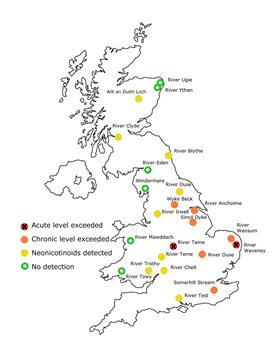
Rivers close to key growing areas in Norfolk, Suffolk and Lincolnshire have been found to be heavily contaminated with neonicotinoids, according to the first analysis of new monitoring data.
Under a new EU water framework ‘watch list’ scheme, the UK had to monitor the presence of five common neonicotinoids in rivers – Imidacloprid, Clothianidin, Thiamethoxam, Acetamiprid and Thiacloprid.
In 2016, 23 sites across the UK were monitored, with 88 per cent found to be contaminated, eight out of 16 rivers monitored in England exceeded chronic pollution limits, and two were acutely polluted. Data was collected by the Environment Agency during 2016, and accessed by insect conservation group Buglife in November 2017.
The River Waveney on the Norfolk-Suffolk Border was the worst polluted river with the acute harm level exceeded for a month, according to the data. The River Wensum in Norfolk was also chronically polluted, as well as the River Ouse (Yorkshire), the River Ancholme (Lincolnshire) and the River Wensum (Norfolk).
The rivers exceeding their limits were all in England with a cluster in Eastern England. More Clothianidin was detected than any other neonicotinoid.
Specific concerns were raised about the levels of imidacloprid in rivers, including urban rivers and a remote Scottish stream in the Cairngorms. Imidacloprid is a rare arable insecticide, but its high persistence in soil means that it will continue polluting water in arable areas for years.
It is still used in greenhouses, and as a flea treatment on pets, according to Buglife, which said the most likely source of pollution in the Caingorms is a treated dog entering the stream.
Among a list of recommendations, the organisation has called for more systematic monitoring from the government following the results, highlighting that aquatic insects are just as vulnerable to neonicotinoids as pollinators, but have received less attention.
It also said that the use of imidacloprid as an externally applied veterinary medicine should be suspended in the UK as the measure most likely to rapidly reduce chronic pollution levels.
And it said Defra should establish an initiative to transform insecticide environmental risk management with formal cooperation between various organisations, such as the Environment Agency and the Chemicals Regulation Directorate.
“We are devastated to discover that many British rivers have been heavily damaged by neonicotinoid insecticides,” said Buglife CEO, Matt Shardlow. “It is vital that action is taken to completely ban these three toxins, including in greenhouses and on pets, before another year of disgraceful pollution occurs.”
CEO of the Angling Trust and Fish Legal Mark Lloyd called the results “alarming”. “Three years ago, the Angling Trust pressed the Environment Agency to sample neonicotinoids in rivers after academic papers showed that they can have a significant impact on insects, the main food for most fish,” he said.
The Rivers Trust said it works closely with farmers and growers to reduce and target chemical and fertiliser usage, but warned that some chemicals are “too persistent to be tolerated”.



